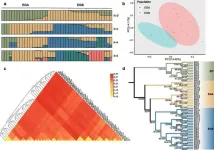(Press-News.org) Periods of fasting reprogram the immune system’s natural killer cells to better fight cancer, according to a new study in mice from researchers at Memorial Sloan Kettering Cancer Center (MSK).
Fasting and other dietary regimens are increasingly being explored as ways to starve cancer cells of the nutrients they need to grow and to make cancer treatments more effective.
Now a team of researchers from MSK’s Sloan Kettering Institute and their collaborators have shown for the first time that fasting can reprogram the metabolism of natural killer cells, helping them to survive in the harsh environment in and around tumors, while also improving their cancer-fighting ability. The study, led by postdoctoral fellow Rebecca Delconte, PhD, was published June 14 in Immunity.
The findings could help explain one of the mechanisms by which fasting may help the body defend against cancer — along with more generally reducing fat and improving metabolism. And while more research is needed, the results also suggest fasting could be a strategy to improve immune responses to make immunotherapy more effective, the study authors note.
“Tumors are very hungry,” says immunologist Joseph Sun, PhD, the study’s senior author. “They take up essential nutrients, creating a hostile environment often rich in lipids that are detrimental to most immune cells. What we show here is that fasting reprograms these natural killer cells to better survive in this suppressive environment.”
What are Natural Killer Cells?
Natural killer cells, or NK cells for short, are a type of white blood cell that can kill abnormal or damaged cells, like cancer cells or cells infected with a virus. They get their name because they can destroy a threat without ever having encountered it before — unlike T cells, which require prior exposure to a specific enemy to mount a targeted response.
In general, the more NK cells that are present within a tumor, the better the prognosis is for the patient.
For the study, mice with cancer were denied food for 24 hours twice a week, and then allowed to eat freely in between fasts. This approach prevented the mice from losing weight overall, the authors note.
But these periods of fasting had a profound effect on NK cells.
Just as happens in humans, the mice saw a drop in their glucose levels and a rise in free fatty acids, which are lipids released by fat cells that can serve as an alternative energy source when other nutrients aren’t present, Dr. Delconte says.
“During each of these fasting cycles, NK cells learned to use these fatty acids as an alternative fuel source to glucose,” she says. “This really optimizes their anti-cancer response because the tumor microenvironment contains a high concentration of lipids, and now they’re able enter the tumor and survive better because of this metabolic training.”
Fasting Reprograms NK Cells
The fasting also led to a redistribution of NK cells within the body, the researchers observed.
Many of the NK cells traveled into the bone marrow, where, thanks to the fasting, they were exposed to high levels of a key signaling protein called Interleukin-12. This primed the NK cells to produce more Interferon-gamma — a cytokine that plays an important role in anti-tumor responses.
Meanwhile, NK cells in the spleen were undergoing a separate reprogramming, making them better at using lipids as a fuel source.
“With both of these mechanisms put together, we find that NK cells are pre-primed to produce more cytokines within the tumor,” Dr. Delconte says. “And with the metabolic reprogramming, they’re more able to survive in the tumor environment, and specialized to have improved anti-cancer properties.”
It’s unclear yet whether there are two separate populations of NK cells that get trained differently in different parts of the body, or whether the cells end up passing through both sites during their weeks-long life cycle.
“That’s the million-dollar question,” Dr. Sun says. “And one that we have only begun to answer using the cell-labeling techniques we used in this study.”
While human bone marrow samples weren’t studied as part of the project, the researchers note that blood samples from cancer patients show that fasting causes a reduction of freely circulating NK cells in people, just as they observed in mice.
Potential to Improve Cancer Treatments
There are several potential opportunities to advance the mouse-model research toward the clinic, the researchers say. First, clinical trials are already beginning to study the safety and effectiveness of fasting in combination with standard existing treatments. Another avenue would be to identify drugs that could target the underlying mechanisms without requiring patients to fast. Third, NK cells might be able to be put into a fasted state outside of the body, and then be administered to improve treatment effects.
At present, however, more clinical data is still needed about the effects of fasting for people with cancer, says Neil Iyengar, MD, an MSK breast medical oncologist and leading researcher on diet, metabolism, and cancer, who was not directly involved in the study.
“There are many different types of fasting, and some might be helpful while others might be harmful,” he says. “Patients should speak with their doctors about what’s safe and healthy for their individual situation.”
Additional Authors and Funding
Additional authors on the study include Mark Owyong, Endi Santosa, and Inez Rogatsky of MSK and Weill Cornell Medical College; Katja Srpan, Aamna Abbasi, Carlos Diaz-Salazar, and Katharine Hsu of MSK.; Tomi McGuire of Weill Cornell; Sam Sheppard of Imperial College London; Jerold Chun of Sanford Burnham Prebys Medical Discovery Institute; Stefan Jordan of Charité - Universitätsmedizin, Germany; and Miriam Merad of the Icahn School of Medicine at Mount Sinai.
The research was supported by the National Institutes of Health (R01DK099087, R01AI148129, AI100874, AI130043, AI155558, P30CA008748); Australia’s National Health and Medical Research Council (GNT1158615); a PICI@MSK Postdoctoral Fellowship; a Cancer Research Institute Postdoctoral Fellowship; the Deutsche Forschungsgemeinschaft; The Hospital for Special Surgery’s David Z. Rosensweig Genomics Center; MSK’s Ludwig Center for Cancer Immunotherapy; the American Cancer Society; and the Burroughs Wellcome Fund.
Read the study: “Fasting Reshapes Tissue-Specific Niches to Improve NK Cell-Mediated Anti-Tumor Immunity,” Immunity. DOI: 10.1016/j.immuni.2024.05.021
END
Fasting primes the immune system’s natural killer cells to better fight cancer, new study in mice finds
2024-06-14
ELSE PRESS RELEASES FROM THIS DATE:
Are patient partners a necessity in research?
2024-06-14
Sjögren’s disease is a systemic autoimmune disorder that often causes sicca symptoms – or dryness of the eyes and mouth, alongside many other complications such as fatigue, pain, and neurological manifestations. There are treatments that help with symptoms, but none that address the underlying disease processes.3 One key issue in developing new treatments is that Sjögren’s can differ from person to person – and that makes it hard to measure and compare outcomes in a clinical trial.
NECESSITY is an interventional trial looking at new clinical endpoints in Sjögren’s disease. ...
Encouraging cooperation in inflammatory arthritis
2024-06-14
Inflammatory arthritis describes a group of diseases caused by an overactive immune system. The different types of inflammatory arthritis include rheumatoid arthritis, psoriatic arthritis, juvenile idiopathic arthritis, and ankylosing spondylitis. The most common symptoms are joint pain and stiffness. Pain is the predominant symptom in the majority of people with inflammatory arthritis, which contributes to the global burden of rheumatic and musculoskeletal conditions.1 Knowledgeable support can reduce ...
Protection against disease and treatment toxicity
2024-06-14
Autologous hematopoietic stem cell transplantation (aHSCT) for SSc has been proven the most effective treatment strategy with regard to overall and event free survival in selected patients.2 But a key limitation is its toxicity, and new treatment options are needed. Two abstracts presented at the 2024 EULAR congress in Vienna focused on novel approaches.
Jörg Henes presented on behalf of the AST MOMA investigators. This prospective, open-label, study evaluated the feasibility of aHSCT in patients with impaired lung or heart function, and also ...
Does BMO induced by mechanical stress progress to structural lesions?
2024-06-14
BMO in the sacroiliac joint on MRI is present in up to 84% of people with non-radiographic axSpA – but it is also often seen in a non-inflammatory setting, such as in women after childbirth.1,2 As back pain is common after childbirth, differential diagnosis with axSpA is an important issue in clinical practice.1 In axSpA, active inflammatory lesions are likely to progress to structural lesions over time – particularly fat lesions and erosions. But it is not known whether the same is true for BMO induced by mechanical stress. In June 2024, EULAR – The European Alliance of Associations for Rheumatology – held its annual congress ...
Is fish intake linked to JIA?
2024-06-14
In 2019, a Swedish prospective birth cohort study of over 15,000 children showed that consuming fish at least once a week during pregnancy and during the first year of life was associated with up to a 5-fold increased risk of JIA, compared to those with fish consumption less than once a week. This increased risk was primarily attributed to elevated exposure to heavy metals.1 Now, new research shared at the 2024 congress of EULAR – The European Alliance of Associations for Rheumatology – is investigating ...
Unpicking the complexity of systemic sclerosis
2024-06-14
SSc is a connective tissue disease with variable clinical presentation. It may affect the skin, blood vessels, heart, lungs, kidneys, gastrointestinal tract, and musculoskeletal system – and this complexity and diversity makes it challenging to treat.2 This clinical heterogeneity in SSc may be partially explained by SSc-specific antibodies, but a better understanding of additional risk factors and patient stratification is still needed. Three abstracts shared at the 2024 EULAR congress present a selection of new clinical research to enrich knowledge ...
Group tests novel therapeutic strategy to minimize progression of Duchenne muscular dystrophy
2024-06-14
In an animal model of Duchenne muscular dystrophy, Brazilian researchers tested a therapy that combines photobiomodulation using laser light or light-emitting diodes (LEDs) with idebenone, an antioxidant compound investigated for application in neurodegenerative diseases.
As reported in an article published in the journal PLOS ONE, the strategy prevented muscle degeneration and improved regenerative capacity in the muscle fibers affected by the disease.
Duchenne muscular dystrophy is the most common and most severe form of childhood muscular dystrophy and most often ...
NMDP and CIBMTR share new, promising stem cell transplantation trial data using mismatched, unrelated donors at the 2024 EHA Congress
2024-06-14
MINNEAPOLIS, June 14, 2024 — NMDPSM, a global nonprofit leader in cell therapy, and the CIBMTR® (Center for International Blood and Marrow Transplant Research®) announced interim results from the ACCESS trial as an oral abstract during the European Hematology Association (EHA) Annual Meeting in Madrid, Spain. The study demonstrated that adults with hematologic malignancies who received peripheral blood stem cell (PBSC) transplant from HLA-mismatched unrelated donors (MMUD) followed by post-transplant cyclophosphamide (PTCy) graft-versus-host-disease (GvHD) prophylaxis exhibited a 79% overall survival (OS), the primary ...
Global trial confirms benefit of antacids on bleeding prevention for ventilated patients
2024-06-14
Hamilton, ON (June 14, 2024) – A widely available drug helps prevent upper gastrointestinal bleeding in critically ill adults on a breathing machine, according to the results of a global study and meta-analysis led by researchers at McMaster University.
The research, published on June 14, 2024 in The New England Journal of Medicine and NEJM Evidence, investigated the effect of the gastric acid suppressant pantoprazole, which is primarily used to treat heartburn caused by gastroesophageal reflux disease (GERD).
Patients ...
Tea crop saviors: Genomic insights into the tea grey geometrid's survival strategy
2024-06-14
In a breakthrough that could redefine tea crop protection, a new study has shed light on the genetic makeup of the tea grey geometrid, Ectropis grisescens. Through the re-sequencing of 43 genomes, scientists have mapped out the pest's population structure and its remarkable adaptation to tea crops, offering new avenues for managing this agricultural adversary.
Amidst the lush tea plantations, a microscopic menace looms—the tea grey geometrid, a pest that can decimate tea yields with its insatiable appetite. The economic and qualitative havoc wreaked by this insect has prompted an urgent call for innovative pest control solutions. However, the genomic secrets ...



